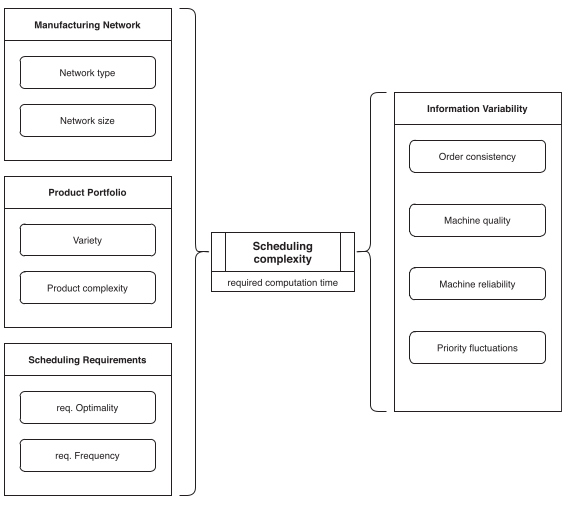2022

Oliver Antons; Julia C. Arlinghaus
A Manufacturing Scheduling Complexity Framework and Agent-Based Comparison of Centralized and Distributed Control Approaches Journal Article
In: IEEE Journal of Emerging and Selected Topics in Industrial Electronics, vol. 3, no. 1, pp. 31-38, 2022.
Abstract | Links | BibTeX | Tags: Autonomy & Decision-making Authority, Complexity Theory, Decentralized Control, Job-shop scheduling, Manufacturing, Optimization, Production
@article{antons2021ieee,
title = {A Manufacturing Scheduling Complexity Framework and Agent-Based Comparison of Centralized and Distributed Control Approaches},
author = {Oliver Antons and Julia C. Arlinghaus},
url = {https://doi.org/10.1109/JESTIE.2021.3100272},
doi = {10.1109/JESTIE.2021.3100272},
year = {2022},
date = {2022-01-01},
urldate = {2022-01-01},
journal = {IEEE Journal of Emerging and Selected Topics in Industrial Electronics},
volume = {3},
number = {1},
pages = {31-38},
abstract = {Centralized approaches are often employed to control manufacturing networks in practice. The introduction of industrial cyber-physical systems driven by advances in microcontroller, sensor, and networking technologies is providing distributed control systems with the technical requirements needed to mitigate the drawbacks of centralized control, such as long optimization times that result in long planning horizons and inflexibility. While such distributed control approaches respond to the growing challenges faced by industry in terms of flexibility, resilience, and lot sizes, the inherent myopia of autonomous agents may discourage practical application. In this article, we develop a scheduling complexity framework derived from the literature, which allows researchers and prationers alike to evaluate the suitability of both centralized and distributed control approaches for manufacturing planning and control. This framework utilizes quantifiable environment variables, which influence we study by means of a multiagent discrete event simulation.},
keywords = {Autonomy \& Decision-making Authority, Complexity Theory, Decentralized Control, Job-shop scheduling, Manufacturing, Optimization, Production},
pubstate = {published},
tppubtype = {article}
}
2021

Oliver Antons; Julia C. Arlinghaus
Distributing decision-making authority in manufacturing – review and roadmap for the factory of the future Journal Article
In: International Journal of Production Research, vol. 60, iss. 13, no. 0, pp. 1-19, 2021.
Abstract | Links | BibTeX | Tags: Autonomous production control, Autonomy, Autonomy & Decision-making Authority, Decentralized Control, Industry 4.0, Production planning and control
@article{Antons2021Distributing,
title = {Distributing decision-making authority in manufacturing \textendash review and roadmap for the factory of the future},
author = {Oliver Antons and Julia C. Arlinghaus},
url = {https://doi.org/10.1080/00207543.2022.2057255},
doi = {10.1080/00207543.2022.2057255},
year = {2021},
date = {2021-07-27},
urldate = {2021-07-27},
journal = {International Journal of Production Research},
volume = {60},
number = {0},
issue = {13},
pages = {1-19},
publisher = {Taylor \& Francis},
abstract = {The question of the benefits of autonomous control is more important than ever: production managers, governments and society hope that the vision of smart and digital production systems with high flexibility and low costs may save the value adding and therefore welfare in the high wage, industrialised countries. At the same time, the discussion on the social implications of autonomous objects and decentralised control approaches is growing. Looking back on the history of production research and practice, we find that there has been a constant ply among scholars and production managers between the advantages of the two concepts of centralised and decentralised control approaches. In this article, we study the concept of autonomy in production planning and control, enabled by cyber-physical systems and the distribution of decision-making authority. Based on a profound structured literature review, we analyse the perception of autonomy, the technological requirements and the increasing complexities of modern smart manufacturing. Moreover, we find that recently several research streams suggest the advantages and benefits of autonomous control concepts compared to traditional centralised approaches based on qualitative analysis and identify a distinct lack of quantitative results.},
keywords = {Autonomous production control, Autonomy, Autonomy \& Decision-making Authority, Decentralized Control, Industry 4.0, Production planning and control},
pubstate = {published},
tppubtype = {article}
}